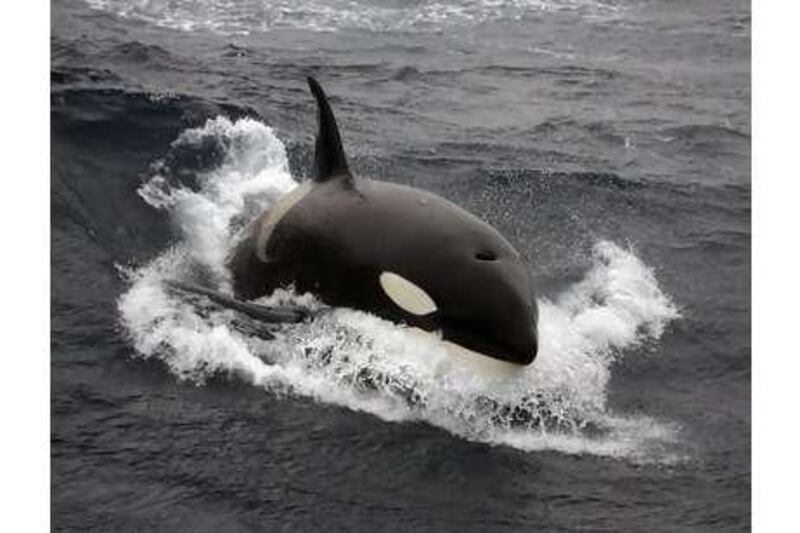RAS AL KHAIMAH // The rare discovery of a killer whale carcass off the coast has been met with a mixture of excitement and sadness by local marine experts. The mammal, believed to be only the fourth such spotted in Gulf waters, was found on Tuesday by two fishermen in the northern emirate. Edwin Grandcourt, a marine specialist with the Environment Agency - Abu Dhabi, said yesterday the discovery of the mammal, whose scientific name is Orcinus orca, was "highly unusual".
"It is extremely exciting, though also very disappointing to see that it has died. It could be one of a pod spotted a couple of months ago off the coast of Abu Dhabi. "Killer whales have been spotted before in these waters but they are very rare. The mammals occur in all oceans, but usually in temperate waters. The water in this area is subtropical." Dr Seif al Ghaith, the executive director for environment protection and development at RAK Municipality, believed this was only the fourth time a killer whale had been spotted in the Gulf - the first being in Abu Dhabi waters, the second off RAK and the third off the Kuwaiti coast.
The Orca, which was believed to have been about nine metres long, was spotted by Abdullah Rashid al Zaabi, 24, and his brother Mohammed, 31, while they were fishing in the Hmara area, approximately 35km from the RAK shore. The brothers, unsure if the mammal was alive and afraid it could be dangerous, called on the support of 10 other fishermen out at sea. Once they confirmed it was dead, they brought it to shore, where scores of onlookers had gathered.
Abdullah said the Orca was the largest creature he had seen in his 10 years on the sea. The find comes after a group of Emirati youngsters on a private boat filmed and photographed a pod of seven killer whales, including a calf, in the waters of Abu Dhabi in June this year. Both Dr Ghaith and Mr Grandcourt said the animal most likely wound up in RAK waters after getting lost. The off-course Orca could have come from the Indian Ocean and travelled here along the Strait of Hormuz, Dr Ghaith added.
Pictures taken by one fishermen on his mobile phone showed that the Orca's tail had been damaged, but Mr Grandcourt said this was unlikely to have been the cause of death. "Without an autopsy, is it not possible to know how it died, but the tail injury would probably have happened after it died because it would have been able to move out of the way of ship traffic. It looks like it has been dead a while."
Dr Ghaith, also a professor of marine science and biology at Emirates University, added: "The Gulf waters are shallow waters, unlike the Indian Ocean waters, and sometimes not conducive with whales. This could be another reason it died." He ruled out water contamination as a cause of death, but warned that such large carcasses could present a danger to ships passing at night if they are not quickly removed from the water.
Despite their name, killer whales are not considered a threat to humans, although there have been a few isolated reports of them attacking people while in captivity. Killer whales are predators, and their diet can include sea birds, turtles, fish, whales, dolphins, porpoises, seals and sea lions. The animal is distinctively coloured, with a black back and white sides and a white spot behind the eyes.
Highly social creatures, they typically they live to the age of 50, although some have been reported to live as long as 80 years. @Email:loatway@thenational.ae @email:ykakande@thenational.ae






